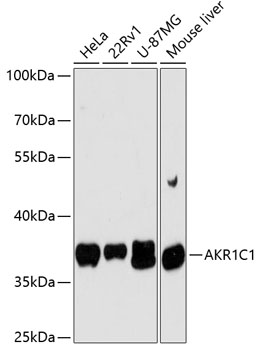Product Name :
AKR1C1 polyclonal antibody Background :
Human liver contains isoforms of dihydrodiol dehydrogenase (DD1, DD2, DD3 and DD4), which belong to the aldo-oxo reductase/aldo-keto reductase (AKR) superfamily, have 20α- or 3α-hydroxysteroid dehydrogenase (HSD) activity. DD1 is also designated AKR1C1, DDH or DDH1, while DD2 also can be designated AKR1C2, dDD, BABP or DDH2. AKR1C3 and 3α-HSD are alternate designations for human DD3 (which is referred to as AKR1C18 in rodents), while DD4 also can be called AKR1C4, CD, CHDR or AKR1C6 (in rodents). DD1 and DD2 are 20α-HSDs, whereas DD3 and DD4 are the 3α-HSDs. The multiple human cytosolic dihydrodiol dehydrogenases are involved in the metabolism of xenobiotics, such as polycyclic aromatic hydrocarbons, pesticides and steroid hormones, and are responsible for the reduction of ketone-containing drugs by using NADH or NADPH as a cofactor. The 20α-HSD catalyzes the reaction of progesterone to the inactive form 20α-hydroxyprogesterone. The 3α-HSD is a cytosolic, monomeric, NADPH-dependent oxidoreductase that reduces 3-keto-5-dihydrosteroids to their tetrahydro products. DD1 and DD2 are ubiquitously expressed, whereas DD4 mRNA is restricted to the liver. DD3 is a unique enzyme that can specifically catalyze the dehydrogenation of trans-benzenedihydrodiol and trans-naphthalenedihydrodiol. Product :
Rabbit IgG, 1mg/ml in PBS with 0.02% sodium azide, 50% glycerol, pH7.2 Storage&Stability :
Store at 4°C short term. Aliquot and store at -20°C long term. Avoid freeze-thaw cycles. Specificity :
AKR1C1 polyclonal antibody detects endogenous levels of AKR1C1 protein. Immunogen :
A synthetic peptide corresponding to residues in Human AKR1C1 Conjugate :
Unconjugated Modification :
Unmodification
AKR1C1 polyclonal antibody Background :
Human liver contains isoforms of dihydrodiol dehydrogenase (DD1, DD2, DD3 and DD4), which belong to the aldo-oxo reductase/aldo-keto reductase (AKR) superfamily, have 20α- or 3α-hydroxysteroid dehydrogenase (HSD) activity. DD1 is also designated AKR1C1, DDH or DDH1, while DD2 also can be designated AKR1C2, dDD, BABP or DDH2. AKR1C3 and 3α-HSD are alternate designations for human DD3 (which is referred to as AKR1C18 in rodents), while DD4 also can be called AKR1C4, CD, CHDR or AKR1C6 (in rodents). DD1 and DD2 are 20α-HSDs, whereas DD3 and DD4 are the 3α-HSDs. The multiple human cytosolic dihydrodiol dehydrogenases are involved in the metabolism of xenobiotics, such as polycyclic aromatic hydrocarbons, pesticides and steroid hormones, and are responsible for the reduction of ketone-containing drugs by using NADH or NADPH as a cofactor. The 20α-HSD catalyzes the reaction of progesterone to the inactive form 20α-hydroxyprogesterone. The 3α-HSD is a cytosolic, monomeric, NADPH-dependent oxidoreductase that reduces 3-keto-5-dihydrosteroids to their tetrahydro products. DD1 and DD2 are ubiquitously expressed, whereas DD4 mRNA is restricted to the liver. DD3 is a unique enzyme that can specifically catalyze the dehydrogenation of trans-benzenedihydrodiol and trans-naphthalenedihydrodiol. Product :
Rabbit IgG, 1mg/ml in PBS with 0.02% sodium azide, 50% glycerol, pH7.2 Storage&Stability :
Store at 4°C short term. Aliquot and store at -20°C long term. Avoid freeze-thaw cycles. Specificity :
AKR1C1 polyclonal antibody detects endogenous levels of AKR1C1 protein. Immunogen :
A synthetic peptide corresponding to residues in Human AKR1C1 Conjugate :
Unconjugated Modification :
Unmodification
-
 Western blot (WB) analysis of AKR1C1 polyclonal antibody at 1:500 dilution Lane1:HEK293T whole cell lysate Lane2:Raw264.7 whole cell lysate Lane3:PC12 whole cell lysate
Western blot (WB) analysis of AKR1C1 polyclonal antibody at 1:500 dilution Lane1:HEK293T whole cell lysate Lane2:Raw264.7 whole cell lysate Lane3:PC12 whole cell lysate
Bioworld Biotech only provide peptides for our antibodies and do not provide additional peptide customization services.
Price/Size :
USD 368/1mg/vial
Tips:
For phospho antibody, we provide phospho peptide(0.5mg) and non-phospho peptide(0.5mg).Describe :
Blocking peptides are peptides that bind specifically to the target antibody and block antibody binding. These peptide usually contains the epitope recognized by the antibody. Antibodies bound to the blocking peptide no longer bind to the epitope on the target protein. This mechanism is useful when non-specific binding is an issue, for example, in Western blotting (WB) and Immunohistochemistry (IHC). By comparing the staining from the blocked antibody versus the antibody alone, one can see which staining is specific; Specific binding will be absent from the western blot or IHC performed with the neutralized antibody.Formula:
Synthetic peptide was lyophilized with 100% acetonitrile and is supplied as a powder. Reconstitute with 0.1 ml DI water for a final concentration of 10 mg/ml.The purity is >90%,tested by HPLC and MS.
Storage:
The freeze-dried powder is more stable. For short time at 2-8°C. For long term storage store at -20°C.
Note :
This product is for research use only (RUO only). Not for use in diagnostic or therapeutic procedures.
 AKR1C1 polyclonal antibody
AKR1C1 polyclonal antibody  Datasheet
Datasheet COA
COA MSDS
MSDS SHIP
SHIP